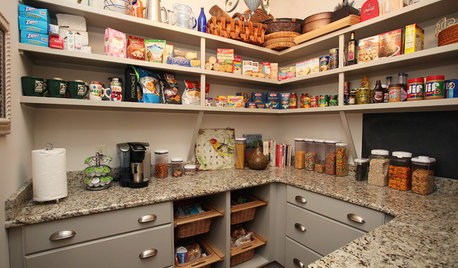Fermented food, heating and other questions
wertach zone 7-B SC
11 years ago
Related Stories

FLOORSIs Radiant Heating or Cooling Right for You?
Questions to ask before you go for one of these temperature systems in your floors or walls (yes, walls)
Full Story
FLOORSWhat to Ask When Considering Heated Floors
These questions can help you decide if radiant floor heating is right for you — and what your options are
Full Story
FARM YOUR YARDTo Get the Food They Believe In, These Urbanites Grow Their Own
Home gardeners farming on their city lots find that local, organic food isn’t the only reward
Full Story
KITCHEN DESIGN9 Questions to Ask When Planning a Kitchen Pantry
Avoid blunders and get the storage space and layout you need by asking these questions before you begin
Full Story
GREAT HOME PROJECTSHow to Add a Radiant Heat System
Enjoy comfy, consistent temperatures and maybe even energy savings with hydronic heating and cooling
Full Story
GREEN BUILDINGHouzz Tour: Passive House in Vermont Slashes Heating Bills
Its ecofriendly, low-maintenance design leaves a family with more time to relax and enjoy the weekend home
Full Story
HOUSEKEEPINGLower Your Heating Bills With Some Simple Weather Stripping
Plug the holes in your house this winter to make sure cold air stays where it belongs: outside
Full Story
FARM YOUR YARDHello, Honey: Beekeeping Anywhere for Fun, Food and Good Deeds
We need pollinators, and they increasingly need us too. Here, why and how to be a bee friend
Full Story
FRONT YARD IDEASWelcome Edibles Into the Front Yard for Fresh Food and More
Give your front yard design a boost and maybe even make new friends by growing fruits and vegetables
Full Story
LIFEHow to Prepare for and Live With a Power Outage
When electricity loss puts food, water and heat in jeopardy, don't be in the dark about how to stay as safe and comfortable as possible
Full Story





laceyvail 6A, WV
wertach zone 7-B SCOriginal Author
Related Professionals
Norton Shores Landscape Architects & Landscape Designers · Salisbury Landscape Architects & Landscape Designers · Brownsville Landscape Contractors · Fort Payne Landscape Contractors · Goodlettsville Landscape Contractors · North Plainfield Landscape Contractors · Sammamish Landscape Contractors · North Aurora Landscape Contractors · Frisco Roofing & Gutters · Georgetown Roofing & Gutters · Houston Roofing & Gutters · Daphne Driveway Installation & Maintenance · Dearborn Driveway Installation & Maintenance · Easton Driveway Installation & Maintenance · Glenview Driveway Installation & Maintenancedigdirt2
James McNulty
chervil2
cannond
wertach zone 7-B SCOriginal Author
oliveoyl3